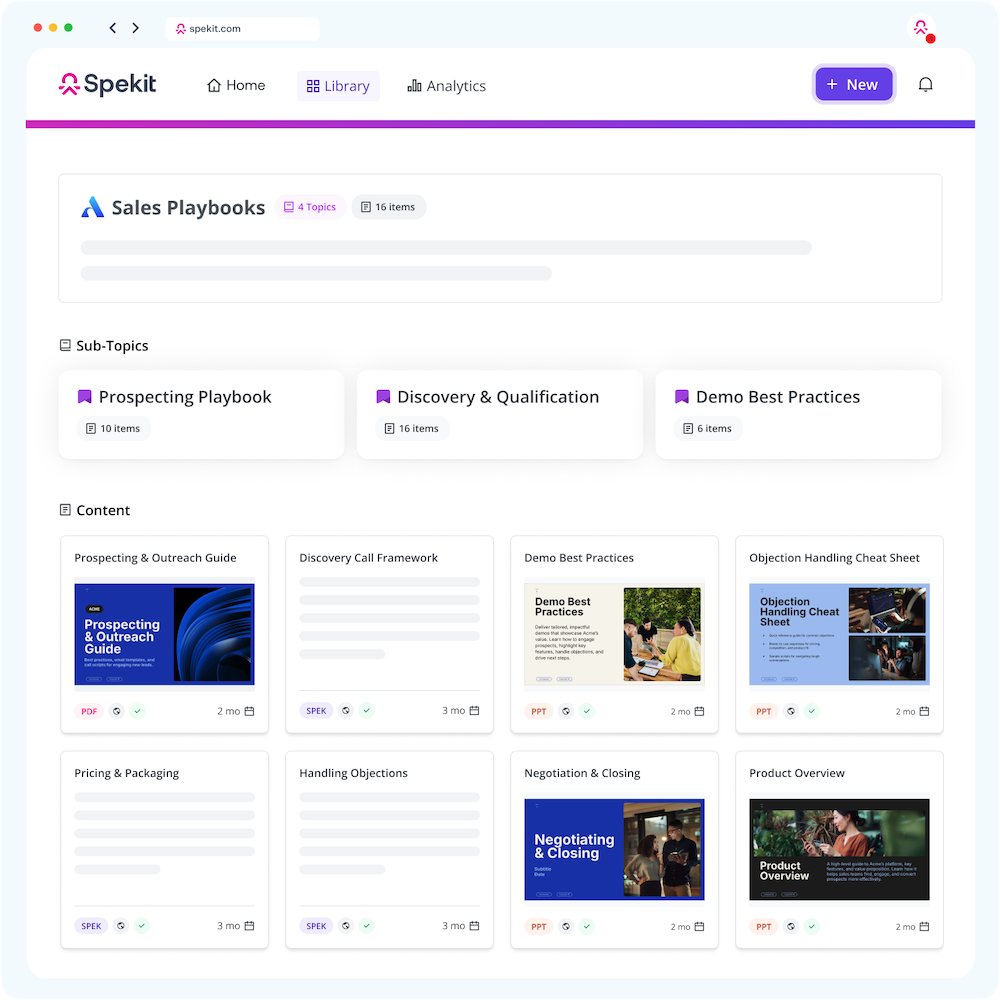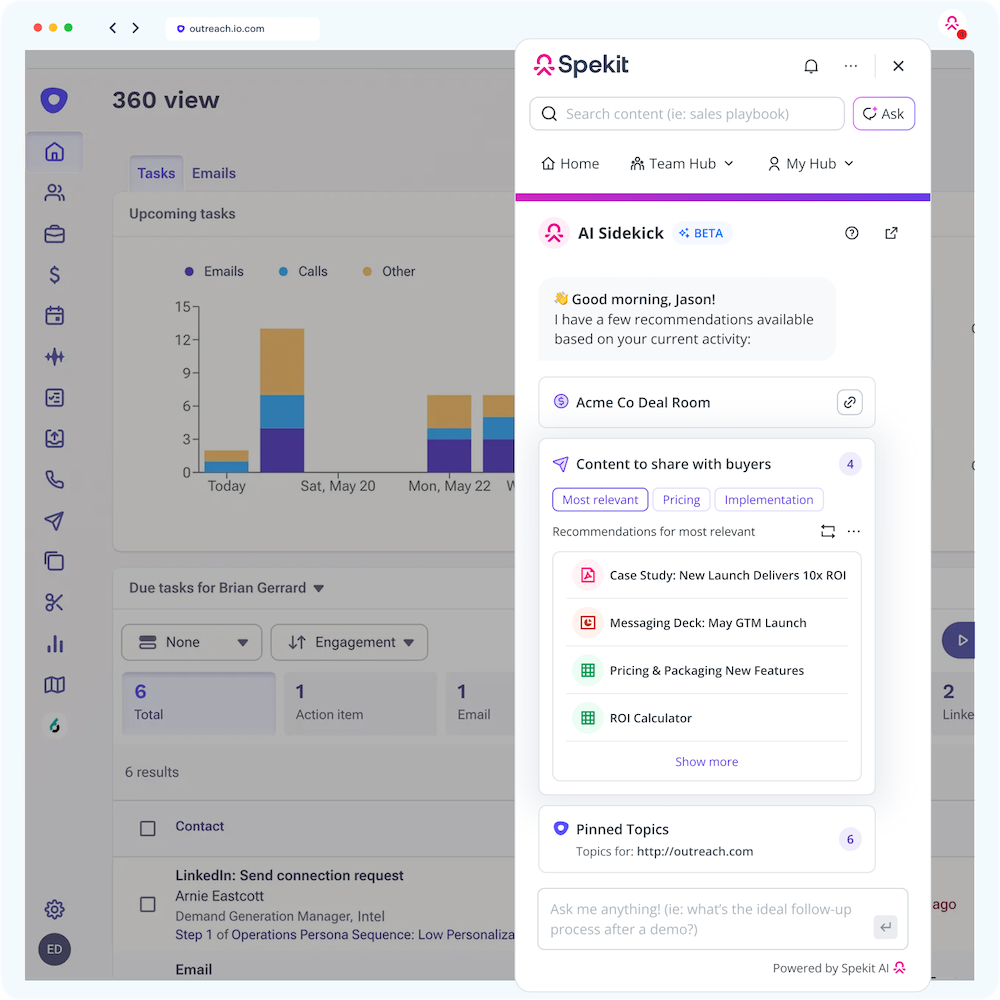A top goal of sales organizations today is prioritizing alignment between their sales and marketing departments. Aligning your sales and marketing teams can impact your whole company, boosting everything from your win rates to your client acquisition to your overall revenue.
However, 90% of marketing and sales professionals say they’re misaligned across strategy and content. In this article, we’ll talk about why this misalignment is happening and how you can overcome it.
What is Sales and Marketing Alignment?
Sales and marketing alignment is the process of unifying your sales and marketing teams to work collaboratively for the betterment of both teams and the benefit of the company as a whole. This alignment can also be called smarketing.
Just 30% of sales professionals say that their sales and marketing teams are strongly aligned—but more than 60% say that alignment between them is becoming increasingly important each year.
How does marketing impact sales? How does sales impact marketing?
Sales professionals aligned with marketing are 107% more likely to beat their sales goals each year than those without no alignment. When marketing works in collaboration with sales, they engage the buyer at every step of the sales process.
These marketing teams better understand what salespeople need to close deals, and they can provide the touchpoints, content, and resources that prospects want to see.
Why and How Do Sales and Marketing Teams Become Misaligned?
A study by Demand Gen Report and InsideView found that sales and marketing teams agree that the biggest challenge they face in creating alignment is a lack of communication. Without effective communication between sales and marketing, it’s impossible for marketing to fully understand what the sales team needs to create pipeline and drive revenue. Everything from lead quality to persona messaging to what happens once a lead is passed off to sales should be discussed to ensure everyone is successful.
44% of sales professionals say they need more leads from marketing, and 55% say that they don’t need more leads—they need better-quality leads. Other challenges for alignment include having broken processes between teams and that sales and marketing success is measured by different metrics.
Benefits of Aligning Your Sales and Marketing Teams
There are numerous benefits to aligning your sales and marketing teams, but let’s look at some of the most impactful ones.
Creates a Better Understanding of Your Target Audience
Understanding your target audience is crucial for both sales and marketing. For example, companies using buyer personas are more likely to exceed revenue and lead goals, have higher-quality leads, shorten sales cycles, and see an increase in several marketing metrics, including the number of website pages visited and email open rate.
However, without communication between sales and marketing, buyer personas may not be complete or may be incorrect or outdated. Sales have many more interactions with prospects and current customers than marketing does, and marketing needs to hear firsthand from sales what their prospects want to see for marketing to understand their target audience and create the right campaigns and resources.
Unifies the Customer Journey
When marketing and sales are aligned, it creates one cohesive buyer journey. If there’s a lack of communication and alignment between sales and marketing, the experience that these two teams offer can be vastly different.
Ideally, when marketing passes a lead onto sales, you want the buyer to feel like they already understand your brand and are ready to move on to the next stage of the customer journey. If the experience sales provide isn’t in line with what marketing provides, it can feel like the buyer journey is starting all over again. Nine out of 10 sales and marketing professionals say that when initiatives and messages are aligned between teams, the customer experience improves.
Encourages Use of Sales Content
According to Forrester, about 65% of sales enablement content goes unused. There are two primary reasons why this lack of usage occurs—and both point to an issue of misalignment between marketing and sales.
The first issue is that sales may not know the content is there. Communication between the two teams and a unified content management system (CMS), like Spekit’s CMS, ensures sales knows what content is available and how they can best leverage it in the sales cycle.

The second issue is that the content might not fit the sales team’s needs. When marketing and sales are aligned, marketing hears firsthand from sales about what their prospects want to see, which allows marketing to create content that’s a better fit.
Supports Faster Growth
Nearly 90% of sales and marketing leaders say that the collaboration between sales and marketing is critical for business growth. More than 80% of these leaders also say that sales and marketing alignment is the largest opportunity for improving overall business performance.

When sales and marketing work together, win rates and overall revenue from both sales and marketing increase. Marketing and sales alignment isn’t just good for those teams—it’s for the good of the whole company.
Improves Lead Quality
Sales professionals say that what they need most from marketing is higher-quality leads. This issue returns to the challenge of utilizing different metrics for sales and marketing. When marketing scores leads differently from how sales scores them, it’s difficult for marketing to provide the high-quality leads that sales needs.

When marketing and sales work together, marketing gains more insight into the company’s ideal customer profile (ICP), which enables them to better score leads and provide sales with higher intent leads. Sales organizations prioritizing alignment with marketing are nearly three times more likely to exceed customer acquisition targets.
How to Align Your Sales and Marketing Teams
Now that we’ve discussed why it’s a good idea to align your sales and marketing teams let’s talk about how to implement that alignment.
1. Determine Specific Sales and Marketing Goals
One of the biggest challenges facing sales and marketing alignment is that the two teams measure success differently. It’s crucial to determine a set of specific goals that intertwine these teams. These teams should have shared, realistic goals built upon communication and collaboration.
For instance, the marketing and sales teams can create one set of metrics to determine lead quality. Those metrics ensure marketing produces the kind of leads that sales know they need. Marketing can then set goals for how many “excellent” or “good” quality leads they should produce per quarter.
2. Prioritize Sales Enablement
There’s a common misconception that sales enablement only supports sales, but the role of enablement has been expanding. More than 50% of CSOs say that sales enablement will support marketing and customer success roles in the next three years.
In many ways, it's where marketing and sales meet, and following sales enablement best practices helps both teams get the most out of that collaboration.
Marketing creates sales enablement resources and content that sales uses to close deals, and these two teams utilize sales enablement tools to break down silos and keep analytics and other resources accessible for both teams. Sales enablement fosters synergy between these departments.
3. Collaborate on Sales and Marketing Content
A whopping 97% of sales and marketing professionals say they face challenges aligning content and messaging between these two teams. There may be issues creating content without input from sales, making product-led instead of customer-led content, and developing content that is not useful to the buyer journey.
Content should be created with input from both teams since sales can offer unique insight into what buyers want to see and read. Customer-led content tends to be more impactful than product-led content because it directly speaks to prospects’ needs and pain points.
4. Improve Cross-team Communication
Nearly 100% of sales and marketing professionals also agree they have issues with process alignment between sales and marketing, which can be improved with cross-team collaboration.
- One place to start is to develop terminology that’s agreed upon by both teams, which can help confusion about the responsibilities of each team, expectations, and how to define success.
- You can also implement a feedback process. When something isn’t working, such as sales receiving leads that aren’t high-quality, there needs to be a way for them to inform marketing so they can change their processes.
- Documentation is also key. When marketing and sales document their processes, they should keep them available in a place accessible to both teams to ensure that each team has insight into the goings-on of the other.
- You can also establish a cadence for how often marketing and sales meet and foster more individual relationships. You may set up a system where a salesperson and a marketing person meet each week, with a rotation, so they’re always meeting new people. Forming these bonds can make them feel like they’re all on one team.
5. Track Marketing and Sales KPIs
Since you’ve already set your sales and marketing collaborative goals, you need to be sure that you can measure their impact. You can’t know if you’re reaching those marketing goals without measuring your marketing and sales KPIs.
Consider investing in a tool with analytics that can track KPIs important to your shared goals. For instance, Spekit’s content analytics can give your marketing team insights into how your sales team and its prospects utilize your content. In doing so, you’re helping your marketing team understand the impact of their content and allowing them to see opportunities for improvement.

6. Create Centralized Communication and Tools
Centralized tools can foster alignment. For example, 78% of sales professionals say that their CRM helps with sales and marketing alignment, and sales professionals with a CRM are 79% more likely to say that their teams are strongly aligned. Tools like a CRM or a CMS make information, resources, and content available and accessible for both teams.
Accessibility is a crucial best practice in sales enablement. Without accessibility, silos can develop between sales and marketing teams, with information stopping with one team and the other team never benefiting from the knowledge.
7. Provide Team Training When Needed
Your sales and marketing teams may receive two very different training programs, which can mean that knowledge isn’t being appropriately shared between the teams. Consider creating training resources that can be utilized by both teams, like buyer persona docs and any other tools that can be useful to both sales and marketing.
However, rather than simply onboarding with these trainings only for them never to be used again, consider making training something that happens naturally within their flow of work. Learning in the flow of work means using tools like Spekit that offer just-in-time enablement, with resources, answers, content, and other information delivered directly to your sales and marketing professionals wherever they already work.
This process reinforces knowledge, which is crucial as sales professionals forget 70% of their training after one week.

8. Improve Value for Your Customers and Clients
Value is a keyword that refers to the benefits of creating an alignment between marketing and sales. When you align these teams, you’re ensuring that your marketing team is creating content and campaigns that are led by the knowledge offered by the sales team. Your sales team will have the resources their prospects need, fostering better customer value.
However, improving customer value starts with valuing what sales and marketing do. When there’s collaboration and communication between these teams, they value what each does more, which helps you create a more positive, uplifting work culture.
How do you achieve sales and marketing alignment for your teams?
Collaboration, communication, and alignment between marketing and sales help both teams succeed. Communication between these teams means creating a cycle in which each team helps the other grow. This alignment isn’t just good for these teams—it’s for the good of the whole company, which is more likely to see revenue increase and their business grow.
If you want to improve your marketing and sales alignment, try Spekit. Spekit improves content, resource, and training accessibility for all your go-to-market teams, giving them all the benefit of just-in-time access to the knowledge they need to succeed, when and where they need it.







